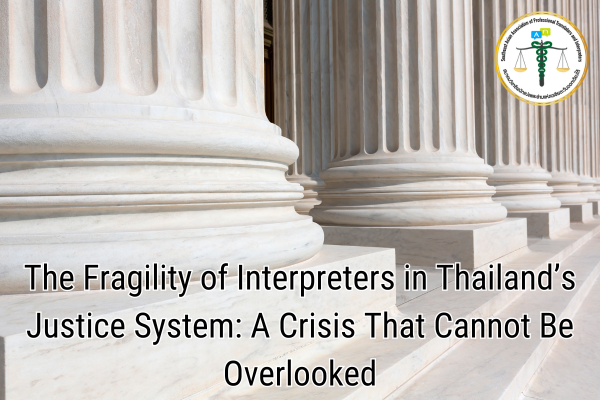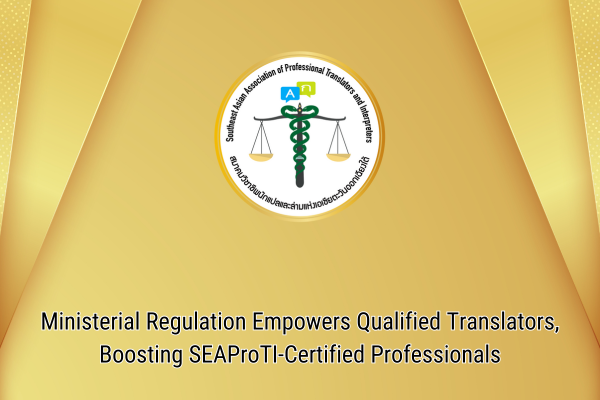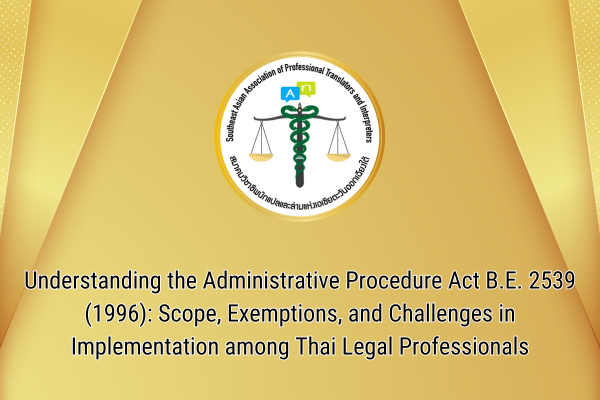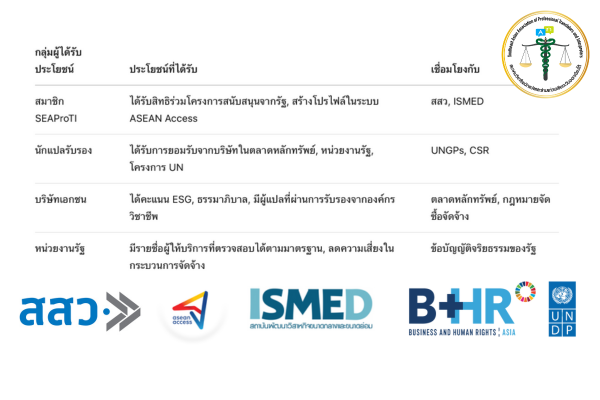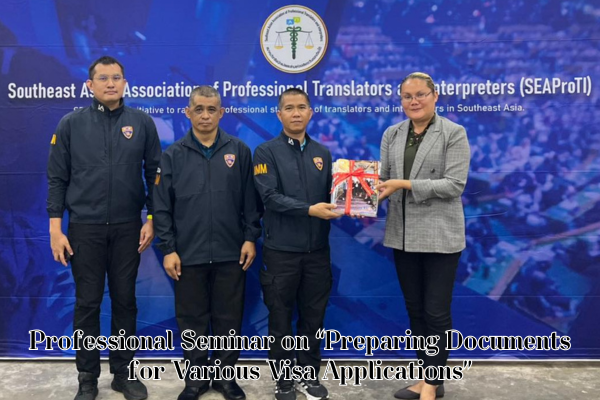The Fragility of Interpreters in Thailand’s Justice System: A Crisis That Cannot Be Overlooked
28 December 2024, Bangkok – In Thailand’s justice system, interpreters play a pivotal role in bridging communication gaps between individuals speaking different languages. However, persistent problems within this sector are increasingly undermining the fairness of the country’s judicial process. The failure to manage interpreters effectively not only jeopardizes court cases but also erodes public confidence in the justice system. Here is an in-depth examination of the issues and their potentially dire consequences if left unaddressed in 2024.
1. Poor-Quality Interpreters: Errors with Grave Consequences
The foremost issue fueling this crisis is the use of unqualified interpreters in judicial proceedings. Many interpreters lack basic linguistic and legal contextual knowledge. Inaccurate or imprecise translations can drastically alter the meaning of testimonies or crucial documents. The result is unjust outcomes, with victims potentially losing their rights and defendants receiving verdicts that do not align with the facts.
2. Low Compensation: A Barrier to Attracting Talent
The remuneration offered by government agencies to interpreters is so low that it fails to attract skilled professionals. Interpreters with strong linguistic and legal expertise prefer to work in the private sector or with international organizations that offer better pay. Consequently, government agencies are forced to rely on interpreters who lack the necessary experience or skills to handle complex and critical tasks.
3. Patronage and Favoritism in Recruitment
In Thailand’s bureaucratic system, the selection of interpreters often operates on a “patronage” basis or through favoritism. Agencies frequently choose individuals they “feel comfortable” working with rather than those who are genuinely qualified. This approach prioritizes pleasing the agency over professional integrity, leading to diminished efficiency in the justice process. Victims and defendants are the ones who ultimately bear the brunt of this flawed system.
4. Lack of Certification: A Critical Weakness
In many countries, interpreters in the justice system must undergo rigorous certification to ensure their competence. Thailand, however, lacks a comprehensive certification system. This allows individuals without adequate legal knowledge or professional skills to assume critical roles. The inevitable errors that arise from this deficiency have long-term repercussions on the fairness of trials.
5. Impersonators in the Interpreter Role: A Hidden Menace
Another alarming issue is the presence of fraudsters masquerading as interpreters. These individuals lack any real linguistic or professional interpreting skills but are still employed in the justice system. Often, they commit serious translation errors and attempt to conceal their mistakes. This leads to irreparable damage, such as disputes over rights or misunderstandings of court rulings due to mistranslation.
6. Knowledge Gaps in Legal Contexts: A Weakness Among Skilled Interpreters
Even interpreters who are linguistically proficient often lack an understanding of legal contexts. This makes them vulnerable to exploitation by unscrupulous employers or clients. Some employers use interpreters as tools to deliberately mislead victims into signing unfavorable documents or engaging in harmful transactions. Without legal knowledge, interpreters are easily manipulated, becoming unwitting accomplices in unethical practices.
7. Pressure and Lack of Respect in the Workplace
Interpreters in Thailand’s justice system often face undue pressure and a lack of respect. Judges, lawyers, and other officials frequently exert significant pressure on interpreters. Working in such a high-stress environment increases the likelihood of errors. Additionally, interpreters are often viewed as mere “tools” rather than as professionals playing a critical role in the judicial process.
8. Potential Consequences in 2024
If these issues remain unaddressed, the fallout in 2024 could be severe. Public trust in the justice system may erode further. Cases involving international rights disputes could become increasingly complex. Moreover, Thailand may face criticism on the global stage for its lack of transparency and inefficiency in handling judicial processes.
Proposed Solutions: The Path to Restoring Interpreter Standards
To avert an impending crisis, Thailand must implement the following measures:
-
Increase Interpreter Compensation: Offer competitive remuneration to attract highly skilled professionals to the justice system.
-
Develop a Certification System: Establish a robust certification process to ensure interpreter quality and set clear standards.
-
Provide Legal Training for Interpreters: Enhance interpreters’ understanding of legal concepts and professional ethics.
-
Screen for Fraudulent Interpreters: Weed out individuals lacking knowledge or harboring malicious intent from the profession.
-
Raise Awareness of Interpreters’ Roles: Shift attitudes within the justice system to recognize the importance of interpreters as key contributors to fairness and accuracy.
Conclusion: Justice Must Begin with Interpreters
Interpreters are a vital cog in the machinery of justice. Without proper management, the problems stemming from this sector will not only compromise individual cases but also undermine the justice system as a whole. Addressing this crisis requires genuine commitment and tangible action. The failures of today could result in a justice system that loses its credibility forever.
About SEAProTI’s certified translators, translation certification providers, and certified interpreters:
The Southeast Asian Association of Professional Translators and Interpreters (SEAProTI) has officially announced the criteria and qualifications for individuals to register as “Certified Translators,” “Translation Certification Providers,” and “Certified Interpreters” under the association’s regulations. These guidelines are detailed in Sections 9 and 10 of the Royal Thai Government Gazette, issued by the Secretariat of the Cabinet under the Office of the Prime Minister of the Kingdom of Thailand, dated July 25, 2024, Volume 141, Part 66 Ng, Page 100.
To read the full publication, visit: the Royal Thai Government Gazette
ความบอบช้ำของแวดวงล่ามในกระบวนการยุติธรรมไทย: วิกฤตที่ไม่อาจมองข้าม
28 ธันวาคม 2567, กรุงเทพมหานคร – ในกระบวนการยุติธรรมของประเทศไทย บทบาทของล่ามคือสะพานเชื่อมการสื่อสารระหว่างผู้คนต่างภาษา แต่ปัญหาที่สั่งสมมาอย่างยาวนานในแวดวงนี้กำลังส่งผลกระทบอย่างรุนแรงต่อความเป็นธรรมในสังคมไทย ความล้มเหลวในการจัดการเรื่องล่ามไม่เพียงแต่ส่งผลต่อคดีความในศาล แต่ยังบั่นทอนความเชื่อมั่นของประชาชนต่อระบบยุติธรรมอีกด้วย นี่คือภาพรวมของปัญหาและผลกระทบที่น่าสะพรึงกลัวที่อาจทวีความรุนแรงขึ้นในปี 2567 หากไม่มีการแก้ไขอย่างเร่งด่วน
1. ล่ามคุณภาพต่ำ: ความผิดพลาดที่ส่งผลร้ายแรง
ปัญหาแรกที่เป็นต้นตอของวิกฤต คือการใช้ล่ามที่ไม่มีคุณภาพในกระบวนการยุติธรรม ล่ามบางรายขาดความรู้พื้นฐานในด้านภาษาและบริบททางกฎหมาย การแปลผิดหรือไม่แม่นยำสามารถเปลี่ยนความหมายของคำให้การหรือเอกสารสำคัญได้อย่างมหาศาล ผลลัพธ์คือคดีความที่ไม่เป็นธรรม ผู้เสียหายอาจสูญเสียสิทธิ หรือผู้ต้องหาอาจได้รับคำตัดสินที่ไม่สอดคล้องกับข้อเท็จจริง
2. ค่าตอบแทนต่ำ: อุปสรรคดึงดูดบุคลากรคุณภาพ
ค่าตอบแทนที่หน่วยงานราชการจัดสรรให้ล่ามอยู่ในระดับต่ำจนไม่อาจดึงดูดบุคคลที่มีความสามารถสูงได้ ล่ามที่มีความรู้ด้านภาษาและความเชี่ยวชาญด้านกฎหมายจึงเลือกทำงานในภาคเอกชนหรือองค์กรระหว่างประเทศที่ให้ค่าตอบแทนที่ดีกว่า ผลลัพธ์คือหน่วยงานราชการต้องพึ่งพาล่ามที่ขาดประสบการณ์หรือทักษะเพียงพอในการทำงานที่มีความซับซ้อนและสำคัญ
3. ระบบอุปถัมภ์และการเลือกปฏิบัติ
ในระบบราชการไทย การคัดเลือกบุคคลมาทำหน้าที่ล่ามมักเป็นไปในลักษณะของ “ระบบอุปถัมภ์” หรือการทำงานแบบพรรคพวก หน่วยงานเลือกใช้คนที่ “สบายใจ” มากกว่าคนที่มีคุณสมบัติจริงจัง การทำงานเพื่อเอาใจหน่วยงานแทนที่จะมุ่งเน้นการทำงานอย่างมืออาชีพ กลายเป็นปัญหาที่บ่อนทำลายประสิทธิภาพของกระบวนการยุติธรรม ผู้เสียหายและผู้ต้องหาต้องเสียสิทธิไปเพราะระบบที่เลือกปฏิบัติแบบนี้
4. ขาดระบบรับรองคุณภาพ: จุดอ่อนสำคัญในกระบวนการยุติธรรม
ในหลายประเทศ ล่ามในกระบวนการยุติธรรมต้องผ่านการรับรองคุณสมบัติ (Certification) อย่างเข้มงวด แต่ประเทศไทยยังขาดระบบนี้ ล่ามที่ไม่มีความรู้ด้านกฎหมายหรือทักษะทางวิชาชีพเพียงพอสามารถเข้ามาทำหน้าที่ได้อย่างง่ายดาย ความผิดพลาดที่เกิดขึ้นจึงเป็นเรื่องที่หลีกเลี่ยงไม่ได้และส่งผลกระทบต่อคดีในระยะยาว
5. มิจฉาชีพในคราบล่าม: ภัยร้ายที่ถูกมองข้าม
อีกหนึ่งปัญหาที่น่าสะพรึงกลัวคือการมีมิจฉาชีพแฝงตัวในแวดวงล่าม บุคคลเหล่านี้ไม่มีความรู้ด้านภาษาและการแปลตามหลักวิชาชีพ แต่กลับสามารถเข้ามาทำหน้าที่ในกระบวนการยุติธรรมได้ หลายครั้งพวกเขาแปลผิดอย่างร้ายแรงและพยายามปกปิดความผิดพลาดของตน ทำให้เกิดความเสียหายที่ไม่อาจแก้ไขได้ในภายหลัง เช่น การกลับคำให้การของพยาน หรือการเข้าใจผิดในเนื้อหาคำพิพากษา
6. การขาดความรู้ด้านกฎหมาย: จุดอ่อนของล่ามที่เก่งภาษา
แม้จะมีล่ามที่เก่งด้านภาษา แต่ความขาดแคลนความรู้ด้านกฎหมายทำให้พวกเขากลายเป็นเหยื่อของนายจ้างที่มีเจตนาไม่บริสุทธิ์ นายจ้างบางรายใช้ล่ามเป็นเครื่องมือในการแปลเนื้อหาให้เหยื่อเข้าใจผิด และลงนามในเอกสารหรือธุรกรรมที่ส่งผลเสียต่อตนเอง ล่ามที่ไม่มีความรู้ด้านกฎหมายจึงถูกหลอกใช้ง่ายและกลายเป็นส่วนหนึ่งของกระบวนการที่ไม่โปร่งใส
7. การถูกกดดันและขาดการให้เกียรติในหน้าที่
บุคคลในกระบวนการยุติธรรมไทยมักไม่ให้เกียรติล่ามที่ปฏิบัติหน้าที่ ล่ามถูกกดดันจากหลายฝ่าย เช่น ผู้พิพากษา ทนายความ หรือเจ้าหน้าที่อื่น ๆ การทำงานในสภาพแวดล้อมที่มีแรงกดดันสูงทำให้ล่ามมีโอกาสผิดพลาดเพิ่มขึ้น บางครั้งบุคคลเหล่านี้ยังถูกมองว่าเป็นเพียง “เครื่องมือ” มากกว่าจะเป็นผู้เชี่ยวชาญที่มีบทบาทสำคัญในกระบวนการ
8. ผลกระทบที่จะเกิดขึ้นในปี 2567
หากปัญหาเหล่านี้ไม่ได้รับการแก้ไขในปี 2567 ความเสียหายที่อาจเกิดขึ้นจะทวีความรุนแรง ประชาชนอาจสูญเสียความเชื่อมั่นในกระบวนการยุติธรรม คดีความที่เกี่ยวข้องกับสิทธิระหว่างประเทศอาจเพิ่มความซับซ้อน และประเทศไทยอาจถูกวิพากษ์วิจารณ์ในเวทีระหว่างประเทศเรื่องการจัดการกระบวนการยุติธรรมที่ไม่โปร่งใสและไม่มีประสิทธิภาพ
วิธีแก้ไข: หนทางสู่การฟื้นฟูแวดวงล่าม
เพื่อหลีกเลี่ยงวิกฤตที่กำลังจะเกิดขึ้น ประเทศไทยจำเป็นต้องดำเนินมาตรการดังต่อไปนี้:
-
ปรับอัตราค่าตอบแทนล่าม: เพื่อดึงดูดบุคคลที่มีความรู้ความสามารถเข้าสู่แวดวงล่ามในกระบวนการยุติธรรม
-
พัฒนาระบบ Certification: เพื่อรับรองคุณภาพล่ามและสร้างมาตรฐานที่ชัดเจน
-
อบรมล่ามด้านกฎหมาย: เพิ่มความเข้าใจด้านกฎหมายและจรรยาบรรณในการปฏิบัติงาน
-
ตรวจสอบมิจฉาชีพในแวดวงล่าม: กำจัดบุคคลที่ไม่มีความรู้หรือมีเจตนาไม่บริสุทธิ์
-
สร้างความตระหนักถึงบทบาทของล่าม: ปรับทัศนคติของบุคคลในกระบวนการยุติธรรมให้เห็นถึงความสำคัญของล่าม
สรุป: ความยุติธรรมต้องเริ่มต้นที่ล่าม
ล่ามเป็นส่วนสำคัญที่ขับเคลื่อนกระบวนการยุติธรรม หากขาดการจัดการที่ดี ปัญหาที่เกิดขึ้นจะไม่เพียงแต่ส่งผลกระทบต่อคดีความ แต่ยังสร้างความเสียหายต่อระบบยุติธรรมในภาพรวม การแก้ไขวิกฤตนี้จำเป็นต้องเริ่มต้นด้วยความจริงจังและการลงมือทำอย่างเป็นรูปธรรม เพราะความล้มเหลวในวันนี้อาจหมายถึงความยุติธรรมที่สูญเสียไปตลอดกาล
เกี่ยวกับนักแปลรับรอง ผู้รับรองการแปล และล่ามรับรองของสมาคมวิชาชีพนักแปลและล่ามแห่งเอเชียตะวันออกเฉียงใต้
สมาคมวิชาชีพนักแปลและล่ามแห่งเอเชียตะวันออกเฉียงใต้ (SEAProTI) ได้ประกาศหลักเกณฑ์และคุณสมบัติผู้ที่ขึ้นทะเบียนเป็น “นักแปลรับรอง (Certified Translators) และผู้รับรองการแปล (Translation Certification Providers) และล่ามรับรอง (Certified Interpreters)” ของสมาคม หมวดที่ 9 และหมวดที่ 10 ในราชกิจจานุเบกษา ของสำนักเลขาธิการคณะรัฐมนตรี ในสำนักนายกรัฐมนตรี แห่งราชอาณาจักรไทย ลงวันที่ 25 ก.ค. 2567 เล่มที่ 141 ตอนที่ 66 ง หน้า 100 อ่านฉบับเต็มได้ที่: นักแปลรับรอง ผู้รับรองการแปล และล่ามรับรอง


